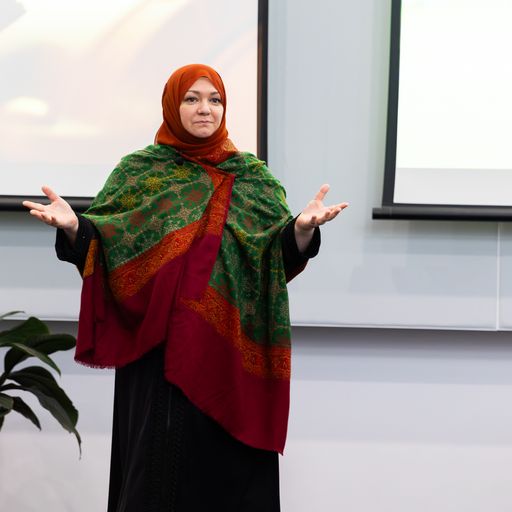Faculty of Arts and Design PhD candidate Senada Meskin was crowned the 2023 University of Canberra winner of the Three Minute Thesis finals, late last evening, for her research on perceptions around Australian Muslim women in the workforce.
Ms Meskin will now progress to the Asia-Pacific round. The Faculty of Health’s Sara Chica-Latorre won both the Runner-Up and People’s Choice Award categories for her work on managing menstrual symptoms for athletes through diet.
This year’s all-female finale saw seven Higher Degree by Research (HDR) candidates, representing four of the University’s faculties, pitching their thesis in three minutes or less.
Other presentations ranged from how biased circumstances influence success, peer pressure in health training, using artificial intelligence (AI) to detect micro-expressions and diagnose mental illnesses, and investigating a model for empathetic AI.
Ms Meskin said she hadn’t anticipated taking home the major prize last night, but was incredibly moved by the support for her work.
“I did not expect to win because I honestly believe that each and every one of us could have won, without question… I’ve grown really close to every participant, so we have this kind of sisterhood. So, if somebody else had won, I would feel equally excited.
“I’m at the very end of my research, so I don’t need that much funding to travel or go to the participants or what else, but I do have research-related expenses that I need to pay off. So, my prize money will go to a good cause and I’m very happy about that.”
Ms Chica-Latorre made it her mission to address a gap in research around menstruation and its impact on female athletes.
“I’m feeling stoked!” Ms Latorre said.

“I am going to use my prize money in two parts. First part, I’m going to use it for some hormonal testing. It’s going to reinforce and strengthen methods for my last study, which was a concern for me in terms of funding. Now, it’s not anymore. And a little bit of money will go into participants’ incentives, so I can make it easier to get more participants for my study.”
Three Minute Thesis challenges participants to condense their research into a three-minute speech with one static PowerPoint slide to support it. Typically, a thesis would be 80,000-words long, taking around nine hours to read.
Three Minute Thesis began at the University of Queensland in 2008 and has grown to over 900 institutions across 85 countries. Participants start with faculty heats in their own institution, progressing to the university’s final where the winner progresses to the semi-final in September to compete with HDR candidates from other universities, before the final in October.
“Three Minute Thesis is a great challenge for our HDR candidates,” said Professor Lucy Johnston, Deputy-Vice Chancellor of Research and Enterprise. “Often, our passion and curiosity as researchers can mean we get caught up in the detail of our work – 3MT challenges us to step back, take a new perspective and view our work with fresh eyes.
“It takes skill to captivate an audience and share complex information in a palatable way, but these skills are crucial to sharing high-quality, evidence-based research with the wider community. These skills are transferable to a career in research, teaching, industry, and everywhere in-between.
“I congratulate all our finalists and winners, and wish Senada the best of luck at the Asia-Pacific Semi-Final, where she will represent the University of Canberra.”



